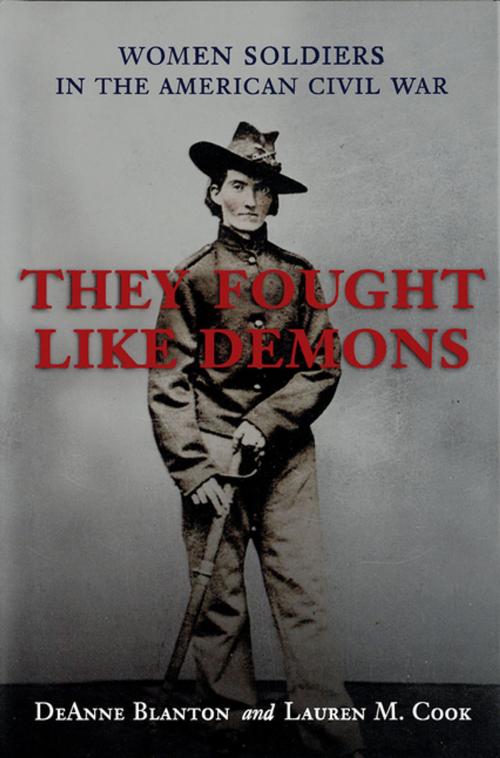They Fought Like Demons
Women Soldiers in the American Civil War
Nonfiction, History, Americas, United States, Civil War Period (1850-1877)| Author: | DeAnne Blanton, Lauren Cook Wike | ISBN: | 9780807158562 |
| Publisher: | LSU Press | Publication: | September 1, 2002 |
| Imprint: | LSU Press | Language: | English |
| Author: | DeAnne Blanton, Lauren Cook Wike |
| ISBN: | 9780807158562 |
| Publisher: | LSU Press |
| Publication: | September 1, 2002 |
| Imprint: | LSU Press |
| Language: | English |
Popular images of women during the American Civil War include self-sacrificing nurses, romantic spies, and brave ladies maintaining hearth and home in the absence of their men. However, as DeAnne Blanton and Lauren M. Cook show in their remarkable new study, that conventional picture does not tell the entire story. Hundreds of women assumed male aliases, disguised themselves in men’s uniforms, and charged into battle as Union and Confederate soldiers—facing down not only the guns of the adversary but also the gender prejudices of society. They Fought Like Demons is the first book to fully explore and explain these women, their experiences as combatants, and the controversial issues surrounding their military service.
Relying on more than a decade of research in primary sources, Blanton and Cook document over 240 women in uniform and find that their reasons for fighting mirrored those of men—-patriotism, honor, heritage, and a desire for excitement. Some enlisted to remain with husbands or brothers, while others had dressed as men before the war. Some so enjoyed being freed from traditional women’s roles that they continued their masquerade well after 1865. The authors describe how Yankee and Rebel women soldiers eluded detection, some for many years, and even merited promotion. Their comrades often did not discover the deception until the “young boy” in their company was wounded, killed, or gave birth.
In addition to examining the details of everyday military life and the harsh challenges of -warfare for these women—which included injury, capture, and imprisonment—Blanton and Cook discuss the female warrior as an icon in nineteenth-century popular culture and why -twentieth-century historians and society ignored women soldiers’ contributions. Shattering the negative assumptions long held about Civil War distaff soldiers, this sophisticated and dynamic work sheds much-needed light on an unusual and overlooked facet of the Civil War experience.
Popular images of women during the American Civil War include self-sacrificing nurses, romantic spies, and brave ladies maintaining hearth and home in the absence of their men. However, as DeAnne Blanton and Lauren M. Cook show in their remarkable new study, that conventional picture does not tell the entire story. Hundreds of women assumed male aliases, disguised themselves in men’s uniforms, and charged into battle as Union and Confederate soldiers—facing down not only the guns of the adversary but also the gender prejudices of society. They Fought Like Demons is the first book to fully explore and explain these women, their experiences as combatants, and the controversial issues surrounding their military service.
Relying on more than a decade of research in primary sources, Blanton and Cook document over 240 women in uniform and find that their reasons for fighting mirrored those of men—-patriotism, honor, heritage, and a desire for excitement. Some enlisted to remain with husbands or brothers, while others had dressed as men before the war. Some so enjoyed being freed from traditional women’s roles that they continued their masquerade well after 1865. The authors describe how Yankee and Rebel women soldiers eluded detection, some for many years, and even merited promotion. Their comrades often did not discover the deception until the “young boy” in their company was wounded, killed, or gave birth.
In addition to examining the details of everyday military life and the harsh challenges of -warfare for these women—which included injury, capture, and imprisonment—Blanton and Cook discuss the female warrior as an icon in nineteenth-century popular culture and why -twentieth-century historians and society ignored women soldiers’ contributions. Shattering the negative assumptions long held about Civil War distaff soldiers, this sophisticated and dynamic work sheds much-needed light on an unusual and overlooked facet of the Civil War experience.















